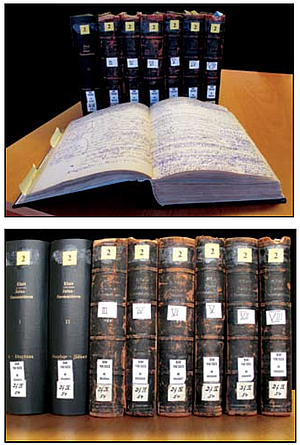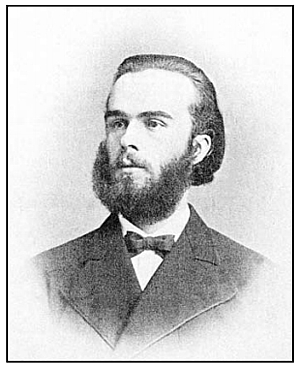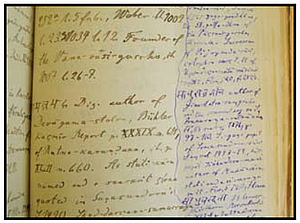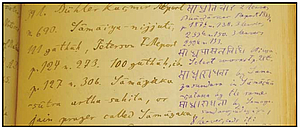
Centre of Jaina Studies Newsletter: SOAS - University of London
In the absence of extensive archaeological evidence, monastic chronologies and hagiographies, inscriptions and the information in the colophones of handwritten or printed Jaina texts are almost the only sources available for the reconstruction of Jaina religious and social history. This fact was highlighted by Walther Schubring who, in his classical work on the Śvetāmbara doctrines of the Jainas, emphasised that '[a]ll history of literature, a building, as it were, has for its ground-floor the bio-bibliographical materials.'[1] Schubring lamented the early demise of Johannes Emil Klatt (1852-1908) who had dedicated his short life to the study of the historical records of the Jainas. Klatt left behind the nearly completed manuscript of his monumental Jaina-Onomasticon, a collection of proper names (Greek: onoma) of Jaina authors, legendary figures, texts and place names with explanatory historical notes, handwritten in English, which is still unpublished. 'Jain research would have enjoyed the great luck of having them [the Jaina bio-biographical materials] at its disposal, if KLATT's Onomasticon had been completed and printed', Schubring wrote. 'Eight volumes from his own hand in alphabetical order contain what was within his reach to collect data concerning Jain authors and works. But he fell severely ill and never recovered. The work was estimated to fill some 1,100 pages in print, but no more than 55 pages have been printed as a specimen thanks to WEBER and LEUMANN'.[2]
Johannes Klatt was born on 31.1.1852 in Filehne, Posen, and died after a long illness in Bonn on 28.8.1908.[3] He studied Indology under Albrecht Weber (1825-1901) in Berlin between 1868-1872 and in 1873 completed his doctorate at the University of Halle with a dissertation entitled De trecentis Cāṇakyae poetae indici sententiis. [4] Klatt worked at the Royal Library in Berlin, part time from 1872, as assistant from 1874, then as Kustos (custodian) from October 1880 and finally as Bibliothecarius (librarian) from April 1889.[5] He was married to Margarete née Patzig (1861-1928) with two sons, the pedagogue Fritz Klatt (1888-1945), who pioneered adult education in the Weimar Republic,[6] and the painter Albert Klatt (1892-1970). Klatt's published research focused on Jaina manuscripts and on the history of Jaina monasticism, based on the available chronologies and biographies. In his preface of 15 October 1892 to the fifty-five page revised edition of a sample of Klatt's magnum opus, Klatt's teacher Albrecht Weber (1892: iii) referred to the 'tragic catastrophe' that prematurely ended Klatt's efforts of ten years to complete his Jaina-Onomasticon, apparently because he had 'unduly exerted himself' for this 'grandiose' achievement, and in future would probably never be able to work again 'at the same speed'. At the time, Weber still expressed his hope that Klatt would recover, which he never did. Yet, already on 21 April 1892, because Klatt was no longer able to do so himself, Weber had presented to the Royal Prussian Academy of Sciences a specimen of Klatt's work, featuring information on important Śvetāmbara commentators such as Abhayadeva, Umāsvāti, Haribhadra, Jinabhadra and all other names beginning with Jina.[7]

Johannes Klatt, Jaina Onomasticon. Berlin 1893 (Manuscript Bound in Eight Volumes. Hamburg, Institut für Indologie und Tibetologie)
A biographical note on Klatt was published during his lifetime by Klatt's 'gurubhāī' and friend Ernst Leumann (1859-1931).[8] It took the form of a mock paṭṭāvalī, which turned out to be one of the main sources of our meager knowledge of the great chronographer's own life:


(Above) Handwritten page from Klatt's Jaina Onomasticon. (Left) Portrait of Johannes Klatt (1852-1908), Courtesy of Harrassowitz Verlag in Wiesbaden
The chronology of his life, presented by way of one of the Paṭṭâvalîs so happily brought to light by his researches, is as follows: - Johannes Klatt: born 1852 A.D. as the son of the postmaster of Filehne (in the Prussian province of Posen); dîkshâ (matriculation) at the Berlin University 1868; after four years' study there, he took his Doctor's degree by presenting (see Boehtlingk's Indische Sprüche, 2nd ed., Part III, Preface) a paper on 'Châṇakya's Sentences' to the University of Halle; 1873 'Volunteer' at the Berlin Royal Library (still earning his living for a couple of years as official stenographist in the Prussian House of Commons), 1880 'Custos,' 1882-92 (nominally also 1893) 'Librarian'.[9]
In his note, published as a footnote to Klatt's last published work, Leumann also mentioned that no further contribution of Klatt 'can come from his pen', and noted the 'irreparable loss' caused by the sudden 'disappearance from literature' of 'the eminent Indianistic Chronicler and Bibliographist' 'as a year or two more of work would have allowed him to complete what has been slowly growing into shape in his study during the past ten years' (ibid.). Leumann was familiar with Klatt's work. Over many years, he supplied his friend with supplementary information for the Jaina-Onomasticon. [10] In addition to editing the last fifteen pages of the Specimen, which Klatt had prepared before his progressing illness rendered work impossible, Leumann also brought Klatt's last article to publication, and in 1893 took over the task of arranging the parts of the text that Klatt left behind. He had them 'bound into eight stately volumes' (ibid.), which his student Schubring later deposited in the library of the Seminar für Kultur und Geschichte Indiens, which is now integral to the library of the Asien-Afrika-Institut of the University of Hamburg.
Klatt's encyclopaedic compilation of literary-bibliographical information on Jaina authors, texts and biographies is still without parallel. Mehta and Chandra's (1970-72) work Prakrit Proper Names covers somewhat similar ground. But Mehta and Chandra focus exclusively on the Śvetāmbara Āgamas and their commentaries however, while Klatt concentrates on post-canonical sources from both Digambara and Śvetāmbara authors. Klatt based his work on the lists of Jaina manuscripts published by Weber (1853-1892), Bühler (1869-1880), Bhandarkar (1882-1897), Kielhorn (1869-1882), Peterson (1882-1899), Khatavate (1891-1901) and all other relevant textual, bibliographical and epigraphical sources at hand. His search for information motivated family holidays, for instance in Italy, where he conducted research on the manuscript collections of Florence, Milan, and elsewhere.[11]
Even without updates, for the historian of Jainism Klatt's Jaina-Onomasticon is an invaluable resource. This was recognised by his contemporaries. Klatt's text was praised both by A. Weber, E. Leumann[12] and W. Schubring as one of the landmarks of modern scholarship in this field. They all agreed that the 4,132 pages long manuscript, starting with and ending with, was ready for publication, albeit with two or three years of editing work remaining. On 15 October 1892, A. Weber (1892: iii-iv) estimated the size of the printed Onomasticon at ca. 1120 pages, twenty times the size of the Specimen, if a system of abbreviations is used to save space, while conceding, because Jaina Studies was still in its infancy, that additions could have been made already half a year later, even to the published Specimen. [13] Schubring (1935 § 4: 8, n. 2) concurred with Weber's verdict that the manuscript was basically ready for publication (albeit in need of supplementation): 'At the time, the manuscript would presumably have been ready for the press, given a practicable technique of abbreviation and onesided type'. Yet, though the work deserves to be accessible to the wider world of scholarship, Johannes Klatt's Jaina-Onomasticon remains unpublished to this day. The task to prepare the manuscript for the press is still a desideratum for modern Jainology.
In 2010, the Centre of Jaina Studies at SOAS initiated the first steps towards the publication of Klatt's work. With the support of the Library of the Asien-Afrika-Institut in Hamburg, which made the original text available for photocopying and photographing, and sponsored by seed funding from the SOAS Faculty of Arts & Humanities Research Fund, the text is currently being transcribed and prepared for editing. The first steps of the transcription process have been funded through the Arts and Humanities Research Council (AHRC) Grant AH/I002405/1. It is hoped that the English text, once published both in print and in an expandable electronic format, will serve as a valuable research tool to future generations of scholarship. It will be the foundation for a forthcoming collaborative research project on Jaina historiography
References
Böhm, Winfried. 'Klatt, Fritz'. Neue Deutsche Biographie 11 (1977) 710-11.
Hartwig. O & K. Schultz (Hg.). Centralblatt für Bibliothekswesen. Leipzig: Otto Harrassowitz, 1884 ff.
Klatt, Fritz. Biographische Aufzeichnungen. Mit einer Vorbemerkung zu den Briefen von Gertrud Breysig und der Bibliographie seiner Schriften und Beiträge von Ursula Schulz. Bremen: Bremer Volkshochschule, 1965 (Bremer Beiträge zur Freien Volksbildung, Heft 7).
Leumann, Ernst. '[Biographical Note on Klatt]'. In: Klatt (1894) 169, n.2.
Leumann, Ernst. 'An Klatt geschickte Ergänzungen zum bibliographischen Index der Jaina-Literatur. 27 loose leaves'. In: Plutat (1998) 32.
Mehta, Mohan Lal & K. Rishabh Chandra. Prakrit Proper Names. Vol. I-II. Ahmedabad: L.D. Institute, 1970-1972.
Plutat, Birte (comp.). Catalogue of the Papers of Ernst Leumann in the Institute for the Culture and History of India and Tibet. University of Hamburg. Stuttgart: Franz Steiner Verlag, 1998.
Rau, Wilhelm (ed.). Bilder 135 deutscher Indologen. Zweite erweiterte und verbesserte Auflage. Wiesbaden: Steiner Verlag, 1965/1982 (Glasenapp-Stiftung Band 23).
Schubring, Walther. Die Lehre der Jainas. Nach den alten Quellen dargestellt. Berlin: Walter De Gruyter & Co., 1935.
The Doctrine of the Jainas. Described after the Old Sources. Translated from the Revised German Edition by Wolfgang Beurlen. 3rd English Edition. 1962. Reprint, with three Indices, enlarged and expanded by Willem Bollée and Jayandra Soni. Delhi: Motilal Banarsidas, 2000.
Die Jaina-Handschriften der Preussischen Staatsbibliothek: Neuerwerbungen seit 1891. Unter redaktioneller Mitarbeit von Günther Weibgen. Leipzig: O. Harrassowitz, 1944.
Weber, Albrecht F. Verzeichniss der Sanskrit- und PrâkṛitHandschriften der Königlichen Bibliothek zu Berlin. Die Handschriften-Verzeichnisse der Königlichen Bibliothek zu Berlin. Band 5.2-3. Berlin: A. Asher & Co., 1888 & 1892.
'Vorwort [15 October 1892]'. In: Klatt (1892b) iii

F. Klatt (1965: 189; cf. 1977: 710). I am indebted to Klaus Karttunen, University of Helsinki, for sharing his records on Johannes Klatt. They include the name of Klatt's son Fritz and pointed me to the photograph in Rau (1982), which is reproduced here. Rau's caption of the photo gives different biodata than F. Klatt: birth Filehne 31.10.1852, death Berlin 27.8.1903.
Hartwig & Schulz (1884: 25, 1889: 510, 1891: 31). See Klatt (1891) on the manuscript collections of the library.
For autobiographical notes, see F. Klatt (1965). Since Fritz was older, his brother Albert could not have been born in 1880 as suggested in the appendix of the book and Böhm (1977: 710).
F. Klatt (1965: 11f.) characterises his father, who was hospitalised in 1892, as "an extremely quiet earnest man, with a pale face...[who] lived entirely for his work and disliked going to social events... [and] had to die so early, because he kept the dark manner in which he perceived life locked inside himself and did not find an expression for it. He felt so much within and took refuge in his studies, and frantic work."
 Dr. Peter Flügel
Dr. Peter Flügel